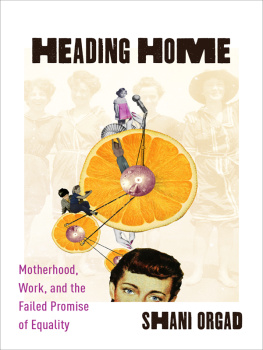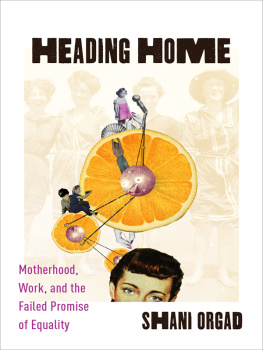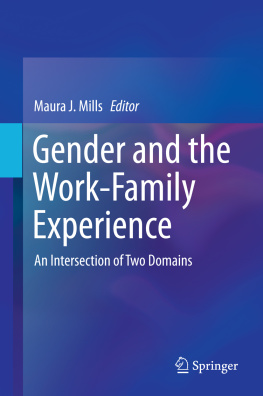CAITLYN COLLINS

Making
Motherhood
Work
How Women Manage Careers and Caregiving
PRINCETON UNIVERSITY PRESS
PRINCETON AND OXFORD
Copyright 2019 by Princeton University Press
Published by Princeton University Press
41 William Street, Princeton, New Jersey 08540
6 Oxford Street, Woodstock, Oxfordshire OX20 1TR
press.princeton.edu
All Rights Reserved
LCCN 2018944494
ISBN 9780691178851
eISBN 9780691185156
British Library Cataloging-in-Publication Data is available
Editorial: Meagan Levinson, Samantha Nader, and Jacqueline Delaney
Production Editorial: Natalie Baan
Text Design: Leslie Flis
Jacket Design: Emily Weigel
Production: Erin Suydam
Publicity: Julia Haav
Copyeditor: Lynn Worth
Jacket image Getty Images
To my mother, with all my love, and the sincere hope that one day employers will stop kicking trash cans across their offices when women announce their pregnancies.
Contents
Preface
Your opponents would love you to believe that its hopeless, that you have no power, that theres no reason to act, that you cant win.
Hope is a gift you dont have to surrender, a power you dont have to throw away.
Hope just means another world might be possible, not promised, not guaranteed.
Together we are very powerful, and [] yes, we can change the world because we have many times before. We need a litany, a rosary, a sutra, a mantra, a war chant of our victories. The past is set in daylight, and it can become a torch we can carry into the night that is the future.
REBECCA SOLNIT, 2016 (EXCERPTS)
Lets be joyful warriors.
KAMALA HARRIS, 2018
Alyson had always been a morning person. But the early hours assumed greater meaning once she entered the professional world after college. Nestled in the predawn darkness, Alyson savored her time moving slowly at home, sipping coffee, watching the news, as if the world had yet to wake up. The quiet was restorative albeit fleeting. For Alyson, these morning rites were necessary preparation for the onslaught awaiting her at work.
At work there wasnt time for coffee. In fact, coffee was discouraged. Alysons boss advised her firmly not to drink anything at all. Restroom breaks were unwelcome in corporate sales and marketing. Lunch breaks were always with clients. So Alyson traversed high-stakes meetings, calls, and presentations at breakneck speed without interruption. Perfectly poised, ever-smiling, she found the need to be on all day exhilarating, but also exhausting.
In her early thirties, Alysons morning rituals took on new significance once she married, gave birth to two daughters, and ascended the corporate ladder rung by hard-fought rung. Her need for rest became all the more pressing as downtime became more rare. She wasnt alone anymore for her predawn routines, though now she welcomed the company. Her older daughter, a toddler, arose and joined her each morning, wiggling sleepy-eyed into Alysons lap as she applied her makeup sitting cross-legged in a long velvet robe at a low table. The Today Show with Katie Couric was always on in the background. It was dark outside, like before, quiet, peaceful, and intimate. This was Alysons favorite part of the day. Before too long, her makeup routine was over and the days rush began. She whisked her girls to daycare or into the hands of a nanny so she could get to work.
Alyson and her husband both worked long hours in jobs they loved. She cobbled together an impressive, frenetic, and ever-shifting network of caregivers for her daughters over the years. A team of babysitters, nannies, friends, neighbors, daycares, before- and after-school activities, sports, and summer camps kept her girls safe and busy until she arrived home. None of these solutions stuck for longer than a year. Some lasted only a few days or a week. Even then, babysitters fell ill and daycares closed for the day. The only remaining option was for Alyson to take her girls to work. They slept in red and yellow sleeping bags in the corner of her early boardroom meetings, much to her supervisors dismay.
Alyson counseled her daughters from a young age about the importance of work for women and the obstacles they would likely face in their careersespecially if they decided to have kids. When her boss first learned that she was pregnant, he requisitioned Alysons largest client markets, effectively demoting her and imposing a sizeable pay cut. Once she became a mother, Alyson endured colleagues impatience when one of her kids ran a fever and she had to leave work unexpectedly. Vacations were a fiction. Although by day Alyson commanded roomfuls of men in suits, she felt frantic, overwhelmed, and inadequateparticularly after a nanny called in sick or a daycare worker admonished her for showing up late to retrieve her girls.
Alyson got divorced a few years later when her children were in elementary school, and she juggled work and single parenting for a time. Then she reached a breaking point and quit her job. She never returned to work full time, deciding instead to take a consulting position that paid far less and lacked benefits but gave her the flexibility to work from home, attend school events, and chaperone field trips. After opting out of an ambitious career, Alysons goals centered on providing her daughters the loving presence of their mother, now that she had time to give. The cost, of course, was her own aspirations. In the years after, she often longed for the stability of that career ladder beneath her feet, and the recognition, pride, and sense of identity that often accompanied good jobs like hers. When two decades later Alyson tried to return to her career, employers considered her obsolete.
I offer this book by way of thanks to Alyson, my mother. To all mothers, really. Its with a sense of radical hopean outlook I learned from herthat I believe a different, better world is possible: one that values the effort mothers devote to raising their children, too often at great personal sacrifice. Alyson deserved a world that was kinder, more egalitarian, and more just. And our family had it better than most. Poor mothers face predicaments that are far more dire.
The stories recounted in this book entreat us to forge a new path that more fairly and adequately supports womens caring labor, and encourages men to share equally in this labor at home. In the chapters that follow, I explore how middle-class working mothers manage careers and caregiving in Sweden, Germany, Italy, and the United Statesfour countries with very different social policies and culturesin order to understand what they want and need to reduce their work-family conflict. We need a legion of joyful warriors to create the better, more loving future my mother and all women and families deserve.
Acknowledgments
No topic of conversation is at once more ordinary and more essential than the state of our work and family lives. We talk constantly about how things are going at home, whats new on the job. But its rare to divulge to others the more intimate, messy parts of our lives and livelihoodseven to our closest friends and loved ones. Yet I find myself in the business of asking folks to sit down and share precisely these experiences with me, a total stranger. Remarkably, people agree, time and again. As a result, I get to share the stories of 135 women making motherhood work in its many incarnationssome heartening, some heartrending, often both. To these women: your insights are an extraordinary gift. Thank you.
Next page






